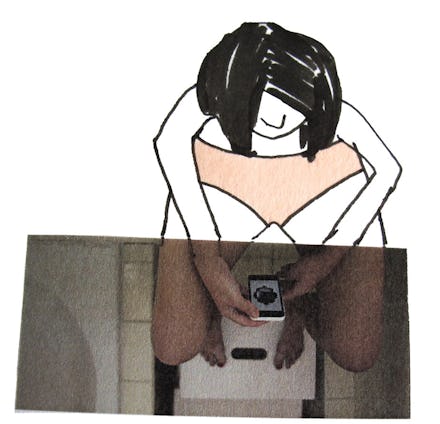Labella Is an App That Will Teach You to Get to Know Your Vagina

Vaginas are weird, mysterious and also a little gross. Or at least, that's what we're taught from a relatively early age. From the time we're children, it essentially becomes second nature to treat our vajayjays/pussies/snatches/hoohas, or any of the other names we call female genitalia to avoid using the word "vagina," with unease, neglect or even derision.
Women are rather under-acquainted with their sexual organs — the result not only of insufficient sex education, but also a sense of shame about their own anatomy. That stigma leaves many people convinced that they should pretty much ignore their "private parts" unless it feels like there's something wrong down there — which can have serious consequences for people's sex lives and overall well-being.
Naturally, there's now an app to fix that. Meet Labella — the wearable underwear that takes the most intimate selfie any woman could imagine, while also teaching people more about their bodies than they're ever likely to learn in a public school health class.
Designed by a group of graduate students at Newcastle University, Labella helps users explore their own anatomy by linking their smartphones with what is, for lack of a better term, a crotch cam. A small camera comes stitched inside a pair of otherwise nondescript bikini briefs, which captures images of their external genitalia, serving as a high-tech update to the hand-mirror-between-the-knees technique of yore.
"The underwear is a middle ground, an everyday accessory, that we use as a way to 'make strange less strange,'" Teresa Almeida, one of the researchers developing Labella, said in an email to Mic. "Some women never looked at or thought of looking at themselves that way, so Labella [brings] it up as [a] possibility."
To use the app, you have to put the underwear on while simultaneously using the camera, creating an experience where the user has to fully engage with their own body.
Before the big selfie reveal, the app presents users with a series of 3D models of the vulva, vagina, anus and perineum, prompting them to identify each body part before getting acquainted with their own genitals. According to the developers, naming is a key first step to teaching users to take better care of their sexual organs.
For instance, while Labella also includes animations of various pelvic floor muscle exercises — which can help people, especially new mothers, ward off issues like urinary incontinence — Almeida and her team believe they wouldn't be of much use if people can't name the different parts of their nether regions.
"Labella was first designed after a series of workshops I'd had with different communities of women on concepts around pelvic fitness," Almeida said. "Basically these workshops pointed out that women in general know little about their bodies, and most importantly they'd like to know more."
What Almeida and her fellow researchers also discovered was that taking genital education too seriously was a quick way to make people uncomfortable. However, incorporating humor into the design of the app increased the women's comfort with their own bodies.
In a paper detailing 14 women's experiences testing Labella, it seems they had exactly the right idea: Several participants noted the "weird, funny" nature of the app made it more memorable than other, more uncomfortable interactions they've had with their genitals.
"[Labella] is not the kind of experience you're going to forget for a while," Elizabeth, one of the participants, told the researchers. "Because it's a bit strange but fun at the same time, and I think that definitely helps more than seeing a picture or a model."
Additionally, some of the women who tested Labella said it made them feel more comfortable talking about what they saw and learned. According to Almeida, who believes Labella is part of a larger push to eradicate the stigma associated with female bodies and sexuality, that's the ultimate goal.
"The goal is to develop the app further so it's available [to help explore] external anatomy and pelvic fitness, as it is now, but also to expand to diverse areas of women's health like periods, female genital mutilation, cervical [screenings] contraception [and more]," Almeida said.
While she conceded "an app alone can't eradicate the stigma," it can provide a whole lot of information women aren't getting at the moment, but desperately need.